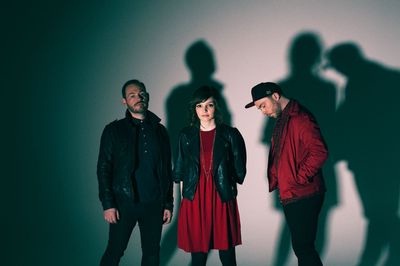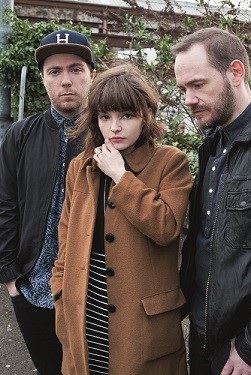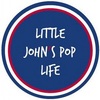-
Interview de Chvrches (17 mars 2014)
Interview de Chvrches
17 mars 2014 – Paris (Le Trianon)
Par Baptiste & Gérald PETITJEAN.
Cette interview est disponible en français et en anglais.
Version française :
Y a-t-il une « Scottish pop » ?
Baptiste & Gérald : Nous aimerions savoir ce que vous pensez de quelques groupes écossais… Commençons par Glasvegas.
Iain Cook : J’ai vraiment adoré leur premier album. Au moment de sa sortie, on avait beaucoup d’amis qui les trouvaient un peu bizarres à cause de leur façon d’utiliser le dialecte, l’accent et tous ces trucs-là. Mais c’est un chouette mélange des genres entre le shoegaze, le rock des années 50, et le Glasgow vécu, avec ses histoires et témoignages. C’est un groupe intéressant et leur nouvel album est réussi.B & G : Primal Scream ?
Martin Doherty : Ce n’est pas vraiment un groupe écossais mais leur leader est écossais [ndlr : Bobby Gillespie]. Je suis un gros fan de Primal Scream. Pour moi, deux de leurs albums sont essentiels : "XTRMNTR", rien que pour la présence de Kevin Shields, et "Evil Heat".B & G : Belle & Sebastian ?
IC : Belle & Sebastian sont là depuis… depuis toujours. J’ai un souvenir qui remonte à l’école : un de mes amis avait eu un exemplaire de "Tigermilk" [le premier album de Belle & Sebastian en 1996], qui n’était pas encore sorti officiellement à l’époque, c’était juste un tirage limité, sur quelques vinyles. Il était très difficile à dénicher. C’était pile au moment où "The Boy With The Arab Strap" explosait. Et mon ami est arrivé à l’école avec cet exemplaire, sur une cassette qu’il avait récupérée grâce à je ne sais qui. C’était vraiment un truc énorme ! C’est toujours un groupe qui compte aujourd’hui. Ce n’est pas le genre de musique que j’écoute, mais j’ai un immense respect pour ce groupe et sa carrière aussi longue.B & G : Est-ce que certains de ces groupes écossais ont été une source d’inspiration pour vous ?
IC : On a grandi en écoutant tous les groupes de Glasgow dont on était fans à l’époque. Les groupes du label Chemikal Underground [ndlr : un label indépendant créé en 1994 par The Delgados, un groupe de rock de Glasgow] étaient particulièrement importants pour nous, c’était notre paysage musical. On adorait The Delgados, Arab Strap, et moi j’étais un fan de Mogwai. Et ce sont des groupes que j’écoute encore aujourd’hui et qui comptent toujours vraiment.B & G : Pensez-vous qu’il y ait une « Scottish pop », une spécificité écossaise ?
MD : Il y a des styles musicaux très différents. Peut-être que ce que les groupes écossais ont en commun, c’est un certain niveau d’autodérision et de sens de l’humour. Oui, voilà, ce serait ça pour moi, l’« ingrédient écossais ». (rires)La synthpop.
B & G : Vous avez dit dans une interview que le terme « synthpop » était plus adapté à des groupes comme Depeche Mode, parce que vous utilisez des techniques de production plus modernes, en particulier sur les rythmes, et que vous mettez l’accent sur la mélodie. Alors, c’est quoi la marque de fabrique Chvrches ?
Lauren Mayberry : Pour moi, « synthpop » renvoie à une certaine époque... à laquelle nous n’appartenons pas vraiment. Enfin je ne sais pas trop, il n’y a pas quelqu’un qui veut m'aider ? (rires) Nous ne voulons pas faire dans le pastiche ni dans le commercial. C’est juste qu’on compose d’abord nos morceaux au synthé, et pas à la guitare.
MD : La « synthpop » se réfère à un temps révolu et dire d’un groupe qu’il fait de la synthpop, ça fait un peu daté. On ne se reconnaît pas vraiment là-dedans. Il y a quelque chose de « synthpop » dans ce qu’on fait parce qu’on utilise des technologies qui étaient utilisées aussi à l’époque. Mais pour décrire notre groupe, je dirais qu’on fait une électro pop dans laquelle les mélodies ont beaucoup d’importance, et qu’on est plus ou moins influencé par le passé, mais rien n’est vraiment défini. Lorsque vous vous attachez trop à un genre, vous vous imposez immédiatement des règles et je considère que c'est une mauvaise chose. Je pense qu'il ne devrait y avoir aucune règle.La tournée et les concerts.
B & G : A propos des concerts, êtes-vous plus inquiets de jouer dans des salles de plus en plus grandes avec le succès ?
IC : Je pense que la nervosité initiale venait du fait qu'il s'agissait au départ d'un projet studio. Nous n’avions pas pensé au live. Techniquement, transposer nos chansons sur scène, dans un environnement réel, fut un exercice difficile. Notre premier concert date de juillet 2012, il y a près de deux ans, nous avons fait beaucoup de concerts depuis, tout cela fait que la nervosité qu’on pouvait avoir au début a complètement disparu. Maintenant, à chaque concert, à chaque tournée, nous nous efforçons de nous améliorer.B & G : Vous avez fait beaucoup de concerts en 2013 et vous êtes encore en tournée à travers l'Europe. Appréciez-vous toujours de vous réveiller à 4 ou 5 heures du matin pour prendre le bus et voyager d'un endroit à un autre... ?
MD : Même pour un million de livres, je n’apprécierai jamais de me réveiller à 4 heures du mat’ ! Mais franchement, c'est difficile de se plaindre de ce travail. Nous pourrions faire des choses bien plus horribles de nos vies. Et j'aime toutes nos chansons. Pour revenir à l'évolution dont on parlait, pour nous, il ne s’agit pas d'être plus à l'aise sur scène, mais de nous sentir meilleurs.
IC : Le seul moment où je peux en avoir marre d’une chanson, c'est quand nous faisons un concert pas terrible pour des raisons techniques. Mais le plus important c’est que les gens passent un bon moment, profitent et chantent, et quand nos morceaux ont un sens pour eux.B & G : Comment résumeriez-vous 2013, en quelques mots ?
LM : J’ai l’impression que nous avons fait beaucoup de chemin, il y a eu beaucoup de « premières fois » [premier album, premiers concerts...]. Nous avons beaucoup appris et nous continuons à apprendre, je crois. Alors, ouais, c’était une bonne année !
MD : Bon, c'est le mot !B & G : Et en janvier 2015, comment aimeriez-vous résumer 2014 ?
MD : En un mot ? (rires) La satisfaction et la réussite, au sens où je l’entends.Le prochain album.
B & G : Vous avez dit dans une interview que vous étiez « impatients de retourner en studio ». Savez-vous quelle direction prendra votre prochain album ?
IC : Nous allons jouer dans plusieurs festivals cet été, mais nous nous accorderons quelques pauses, ce sera un bon point de départ. Nous avons hâte de retourner en studio. On a beaucoup d’idées.
MD : Nous ne serions pas de très bons musiciens si nous n'avions pas d'idées ! (rires )
IC : Disons que nous voulons terminer le gros de la première partie du travail pour septembre...B & G : Quelle couleur choisiriez-vous pour décrire votre premier album ? Et le prochain ?
MD : Je dirais que le premier album est orange foncé et que le second sera rouge.
IC : Le troisième sera violet.
LM : C’est pas mal : rouge et bleu, ça fait violet !Version anglaise :
Pop music in Scotland.
Baptiste & Gérald: We’d like to know what you think about several Scottish bands, starting with Glasvegas?
Iain Cook: I really loved their first album. When it came out, there were a lot of people that we are friends with who were a bit suspicious of them because of the way they were using the dialect and the accent and stuff like that… But it’s a nice kind of blending of styles: shoegaze, 50s-style rock, genuine Glasgow confessions or stories. That’s a really interesting band and their new album is also really good.B & G: Primal Scream?
Martin Doherty: This band is not entirely Scottish but they have a Scottish front man [ndlr: Bobby Gillespie]. I’m a big fan of Primal Scream. From a personal point of view, two records are considered to be very important: “XTRMNTR” [2000], at least because Kevin Shields was involved, and “Evil Heat” [2002].B & G: Belle & Sebastian?
IC: Belle & Sebastian have been around for... as long as I can remember. I remember being at school and one of my friends had got a copy of “Tigermilk” [Belle & Sebastian debut album, 1996] which at the time was not released properly, it was only ever released on a very small pressing of vinyls, so it was really difficult to come by. It was just the time when “The Boy With The Arab Strap” was blowing up. My friend came at school with this copy, on a tape he got from somebody. It was a really big deal! Their importance remains. It’s not the kind of music that I listen to, but I have a lot of respect for a band that has a career as long as they have.B & G: Has any of these Scottish bands been an inspiration to you?
IC: We grew up listening to all of the bands of Glasgow that we were into at the time. All of the bands of the Chemikal underground [an independent record label set up in 1994 by Glasgow Scotland rock band The Delgados] were really important to us, forming our musical landscape. We loved the Delgados, Arab Strap, particularly Mogwai for me. Those are the bands I still listen to and still think they’re really important.B & G: Do you think there is a Scottish pop with a Scottish specificity?
MD: There are different styles. Maybe Scottish bands have in common a certain level of self-depreciation and humor. That’s what, I would say, would be the “Scottish element” (laughs).Synthpop
B & G: You said in an interview that synthpop suited better groups like Depeche Mode because you think you use more modern production techniques, especially in the rhythm techniques, and the focus on melody can make your band more unique. What’s the Chvrches’trademark?
Lauren Mayberry: I think that synthpop implies a certain time period… We are not really part of that. But I don’t really know, does anyone want to help me? (laughs) We don’t want to be a pastiche band nor a chart pop band. We are just writing primarily on the synth instead of the guitar.
MD: Synthpop refers to a period in time and a synthpop band appears to be a retro band. We don’t really subscribe to that. There is a small element of what we do that is in the technology that was used at the time and that we use. But to describe our band now, it’s just “song focused electronic pop music”, somehow influenced by yesterday but it’s not really definite. When you tie something to genre, you immediately impose rules on yourself and I consider that to be a negative thing. I don’t think there should be any rules.Touring
B & G: About the concerts, are you more anxious with the venues getting bigger and bigger as your success is growing?
IC: I think that initial nervousness comes from the fact that it was a studio based project. There were no plans to take it live. Technically, it was a difficult exercise to translate our songs on stage, to translate it well in a live environment. We played our first show in July 2012, that’s nearly two years ago, we played a lot of shows, so I feel like that kind of nervousness about playing live is way gone. Now, every time we play, every tour we do, we thrive to be better.B & G: You did a lot of concerts in 2013 and you are touring a lot around Europe still now in early 2014. Do you still manage to appreciate waking up at 4 or 5 in the morning to take the bus and go from one place to another…?
MD: I don’t think I’ll ever appreciate waking up at 4, even if it was to get a million pounds! But, I mean, it’s hard to complain about this job. There is a lot of worst things that we could be doing with our lives. And I love all our songs. About the evolution, to us, it’s not about being more comfortable on stage, it’s more about feeling better.
IC: The only time I can get bored with playing a song is when we’re not having a great gig for technical reasons. But the most important is that people have a good time and enjoy and sing along, and when it means something to them.B & G: How would you sum up, in a few words, 2013?
LM: I feel like we covered a lot of ground, it was a lot of ‘first times’ of things [first album, first shows…]. We learned a lot, but we are still learning a lot, I think. So, yeah, it was good!
MD: It was good, that’s the word!B & G: And in January 2015, how would you like to sum up 2014?
MD: In one word? (laughs) I would like to achieve satisfaction and success, in the way that I want to.The next album
B & G: You said in an interview that you were “looking forward to getting back to the studio”. Do you know where your second album is heading to?
IC: We play in some festivals during the summer but we have some breaks that we will use to make a proper start. We’re looking forward to getting back to the studios. We have many ideas.
MD: We would not be very good musicians if we had no ideas! (laughs)
IC: Let’s say we want to finish the heavy schedule for September…B & G: Which colour would you choose to describe your first album? And the next one?
MD: I’d say the first album is dark orange; the second album will be red.
IC: The third is going to be purple.
LM: That sounds good. Red and blue, that makes purple!
-
Commentaires






